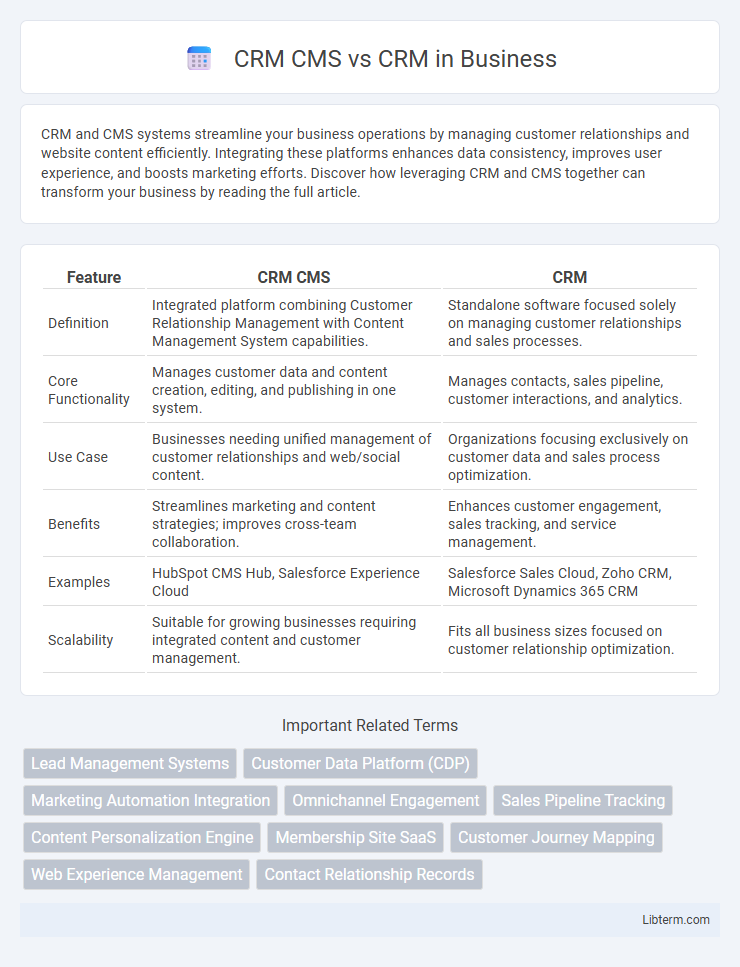CRM and CMS systems streamline your business operations by managing customer relationships and website content efficiently. Integrating these platforms enhances data consistency, improves user experience, and boosts marketing efforts. Discover how leveraging CRM and CMS together can transform your business by reading the full article.
Table of Comparison
| Feature | CRM CMS | CRM |
|---|---|---|
| Definition | Integrated platform combining Customer Relationship Management with Content Management System capabilities. | Standalone software focused solely on managing customer relationships and sales processes. |
| Core Functionality | Manages customer data and content creation, editing, and publishing in one system. | Manages contacts, sales pipeline, customer interactions, and analytics. |
| Use Case | Businesses needing unified management of customer relationships and web/social content. | Organizations focusing exclusively on customer data and sales process optimization. |
| Benefits | Streamlines marketing and content strategies; improves cross-team collaboration. | Enhances customer engagement, sales tracking, and service management. |
| Examples | HubSpot CMS Hub, Salesforce Experience Cloud | Salesforce Sales Cloud, Zoho CRM, Microsoft Dynamics 365 CRM |
| Scalability | Suitable for growing businesses requiring integrated content and customer management. | Fits all business sizes focused on customer relationship optimization. |
Introduction to CRM CMS and CRM
CRM CMS integrates customer relationship management with content management systems, enabling businesses to personalize customer interactions through dynamic content delivery and streamlined data management. CRM focuses primarily on managing customer data, sales tracking, and communication workflows to enhance customer retention and sales performance. Leveraging CRM CMS allows organizations to unify customer insights and content strategies, resulting in improved user engagement and marketing effectiveness.
Key Differences Between CRM CMS and Traditional CRM
CRM CMS integrates customer relationship management with content management capabilities, enabling seamless tracking of customer interactions alongside dynamic content personalization. Traditional CRM systems primarily focus on managing customer data, sales automation, and communication without extensive content management features. The key differences lie in CRM CMS's ability to unify marketing, sales, and content workflows, driving more targeted customer engagement compared to the transactional nature of traditional CRM.
Core Features of CRM CMS Platforms
CRM CMS platforms integrate customer relationship management with content management systems, offering unified tools for contact management, lead tracking, and personalized content delivery. Core features include customizable dashboards, automated marketing workflows, content segmentation based on customer data, and seamless synchronization of sales and marketing activities. These platforms enhance customer engagement by enabling dynamic content updates and analytics-driven decision-making within a single interface.
Core Features of Standalone CRM Systems
Standalone CRM systems specialize in managing customer relationships with core features such as contact management, sales automation, and customer support tracking. These platforms offer robust lead and opportunity management, detailed reporting and analytics, and workflow automation to enhance sales processes. Integration capabilities with third-party tools are present but more limited than CRM CMS solutions, which combine content management and customer data.
Benefits of Integrating CMS with CRM
Integrating a Content Management System (CMS) with a Customer Relationship Management (CRM) platform enhances customer engagement by delivering personalized content based on real-time data and behavior analytics. This synergy streamlines marketing automation and sales processes by centralizing client information, enabling tailored campaigns and improved lead management. Businesses experience increased conversion rates and customer retention through cohesive user experiences across multiple channels optimized by combined CMS-CRM capabilities.
Use Cases: When to Choose CRM CMS Over CRM
CRM CMS platforms excel in scenarios requiring seamless integration between customer relationship management and content management, such as personalized marketing campaigns where dynamic content delivery is crucial. Businesses needing centralized workflows for managing customer data alongside website content benefit from CRM CMS, enabling real-time updates and enhanced customer engagement. CRM alone is preferable when the primary focus is on sales pipeline management and customer interactions without the complexity of content creation and distribution.
Scalability and Customization Comparison
CRM CMS platforms offer enhanced scalability by integrating customer relationship management with content management capabilities, enabling businesses to manage extensive customer data alongside dynamic content efficiently. Customization in CRM CMS solutions is more robust, allowing tailored workflows, personalized content delivery, and seamless adaptation to complex business processes compared to standard CRM systems. Standard CRMs typically provide core sales and customer data management features with limited customization and scalability, making CRM CMS an ideal choice for enterprises requiring flexible growth and comprehensive digital engagement.
Impact on Customer Experience
CRM CMS combines customer relationship management with content management capabilities, enabling personalized content delivery that enhances customer engagement and satisfaction. This integration allows businesses to tailor interactions based on customer data and behavior, resulting in a seamless and consistent experience across all touchpoints. CRM alone focuses on managing customer data and interactions but lacks the dynamic content customization that CRM CMS provides, making the latter more impactful for delivering exceptional customer experiences.
Cost Considerations: CRM CMS vs CRM
CRM CMS platforms typically incur higher initial costs due to integrated content management features combined with customer relationship tools, whereas standalone CRM systems generally have lower implementation expenses focused solely on sales and customer data management. Subscription fees for CRM CMS often reflect their dual functionality, leading to increased total cost of ownership compared to traditional CRM software that may offer modular add-ons at additional cost. Companies must evaluate budget constraints and required features, as CRM CMS investments deliver broader capabilities but come with higher ongoing maintenance and training costs relative to standard CRM solutions.
Choosing the Right Solution for Your Business
Selecting the ideal system between CRM CMS and standalone CRM hinges on business specific needs and operational goals. CRM CMS integrates customer relationship management with content management, streamlining marketing and sales workflows, especially beneficial for businesses heavily reliant on content-driven engagement. Standalone CRM systems offer robust sales and customer data management features, making them suitable for companies prioritizing in-depth customer analytics and sales process automation.
CRM CMS Infographic

 libterm.com
libterm.com